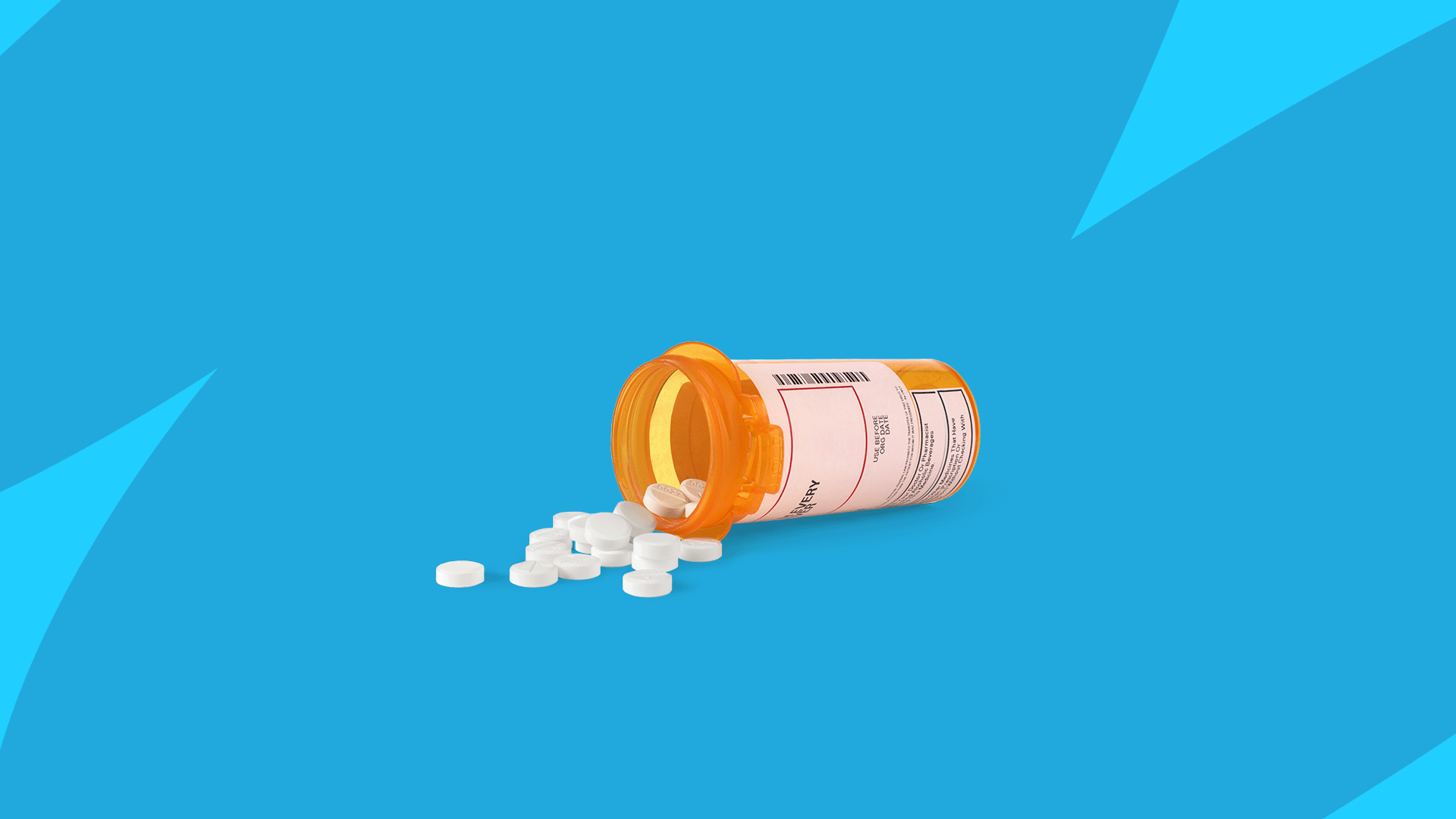Common famotidine side effects | Serious side effects | Weight gain | Hair loss | Dry mouth | Side effects timeline | Contraindications | Warnings | Interactions | How to avoid side effects | How to treat side effects
The generic over-the-counter stomach acid reducer, famotidine, is commonly used for acid indigestion and heartburn relief. People may know it better by its brand-name versions, Pepcid or Zantac. Prescription famotidine is often prescribed at higher doses to help with gastroesophageal reflux disease (GERD), erosive esophagitis, stomach ulcers, duodenal ulcers, and excess stomach acid caused by hypersecretory conditions such as Zollinger-Ellison syndrome.
Famotidine is an antihistamine that blocks histamine 2 (H2), which is responsible for stimulating acid secretion in the stomach. Healthcare professionals call medications like famotidine H2 receptor antagonists (H2RA), or H2 blockers for short. There are a variety of ways that famotidine can be taken: as tablets, chewable tablets, an oral suspension, or by injection for those unable to take medication by mouth. No matter how famotidine is taken, its side effects are typically uncommon and minor.
Common side effects of famotidine
The most common side effect of famotidine is headache, affecting about 1 in 20 people taking the medicine. Other common side effects include:
- Dizziness
- Diarrhea
- Constipation
- Changes in taste
- Low levels of vitamin B12 (if taken for a long time)
Serious side effects of famotidine
The most serious side effects are relatively rare and include:
- Seizures
- Low blood counts
- Heart rhythm problems including heart block
- Hepatitis
- Jaundice
- Pneumonia
- Central nervous system problems such as delirium, confusion, or hallucinations
- Severe allergic reactions
Weight gain
Weight changes are not considered a side effect of famotidine. However, some people may be able to eat more when indigestion and stomach pain are under control, allowing them to gain more weight.
Hair loss
There have been reports of hair loss in people using stomach acid reducers, but it’s rare. For instance, no hair loss was reported during famotidine’s clinical trials. If hair does start thinning while taking famotidine, it will only show up after several weeks of continuous dosing. Talk to the prescribing healthcare provider if hair starts to thin while taking famotidine or any other drug.
Dry mouth
Dry mouth is a rare side effect of famotidine and other stomach acid reducers. The incidence is unknown and it did not occur during the drug’s clinical trials. It is, however, considered a possible side effect of stomach acid reducers if they’re used continuously for several weeks. Dry mouth is not a health-threatening issue, but it is uncomfortable. Ask the prescriber about treatment options if the drug is causing dry mouth.
How soon do famotidine side effects start?
Famotidine begins to show effects about an hour after being swallowed, so some side effects can start that early. These include headache, diarrhea, dizziness, and nausea. Some side effects such as constipation, dry mouth, and many of the serious side effects require a few weeks or months of continuous dosing to become apparent. Allergic reactions, though, could happen within minutes of taking even a single dose.
How long do famotidine side effects last?
Most famotidine side effects are transient and may improve over time. Stopping the medicine will resolve many of them in about 10 to 12 hours after the last dose. Some rare side effects, like blood problems, may take a few days or weeks to get better.
What are the long-term side effects of famotidine?
Over-the-counter famotidine is intended only for short-term use. Even prescription famotidine is prescribed for a limited amount of time. Side effects may occur from taking stomach acid reducers over a long period of time. The most important is vitamin B12 deficiency, which can lead to anemia or neurological problems. The problem can be solved by stopping the medicine and adding vitamin B12 supplements to the daily routine.
Famotidine contraindications
Famotidine is contraindicated in any person with a known allergy to the drug.
Women who are pregnant or breastfeeding can take famotidine as either an off-the-shelf treatment or as a prescription drug. There is no evidence that famotidine will harm a fetus. Famotidine may or may not be present in breast milk, but there is no evidence that it harms a nursing infant.
Famotidine can be prescribed to children as young as 1 year old for peptic ulcer disease (PUD) or to younger infants for GERD. However, it’s not advisable to give over-the-counter famotidine to children 12 or younger unless under the direction of a healthcare professional.
People older than 65 can take famotidine safely, but the dose may need to be reduced in people with declining kidney function. Older adults may also be more vulnerable to some of the central nervous system effects of famotidine like confusion and hallucinations. Famotidine is considered inappropriate for use in older adults at risk for delirium.
Famotidine warnings
Famotidine is generally safe with few side effects, but there are some precautions to remember.
Cautions
As both an over-the-counter and prescription drug, famotidine has a few cautions based on pre-existing medical conditions. These include:
- Kidney disease: Famotidine could build up in the blood in people with declining kidney function, raising the risk of side effects. Dosages may need to be reduced. People with kidney disease should not use OTC famotidine except under the direction of a healthcare professional.
- Phenylketonuria: A rare inherited disorder, phenylketonuria causes phenylalanine to build up in the blood. Pepcid AC tablets contain phenylalanine, so they should be avoided by anyone with this disorder.
Abuse and dependency
Famotidine is not considered a drug with the potential for abuse or addiction, nor is it associated with physical dependence or withdrawal.
Overdose
Call a poison control center or healthcare provider if too much famotidine is taken. An overdose typically causes symptoms similar to many of the side effects of famotidine.
The maximum daily dose of famotidine varies by the condition being treated but tops out at 80 mg a day when prescribed by a healthcare professional. When self-medicating, do not take more than 40 mg (two tablets) a day.
Famotidine interactions
No drugs are absolutely prohibited to be taken together with famotidine, but many drugs may be less effective. The issue is stomach acid. Famotidine decreases the amount of acid in the stomach. Many drugs are designed to be partly broken down in the stomach to be fully absorbed. When stomach acid decreases, less of the drug gets into the body, making the drug less effective. Healthcare professionals are aware of these interactions and will adjust doses as needed. Tell your healthcare professional about all medications you are taking, including over-the-counter famotidine.
A few oral drugs, however, are more effectively absorbed into the body because of reduced stomach acid. More drug enters the body, and more side effects are experienced. Again, healthcare professionals are aware of these drug interactions and will adjust dosages accordingly.
Finally, famotidine can slow down either the breakdown of other drugs by the liver or the elimination of some drugs by the kidneys. This will cause concentrations of those drugs to build up in the body and make side effects more likely. For example, Zanaflex (tizanidine), a muscle relaxant, may result in low heart rate or blood pressure when combined with famotidine..
Related: What is Zanaflex?
How to avoid famotidine side effects
Although few people have significant problems when taking famotidine, there are smart ways to keep side effects at bay.
1. Take famotidine as directed
Follow the instructions and dosing schedule on the package. Do not exceed 40 mg a day if self-medicating. If taking prescription famotidine, follow the prescriber’s instructions or those written on the prescription label. If a dose is missed, take it when remembered. If it’s almost time for the next dose, skip the missed dose and take the next dose as scheduled.
2. Follow the advised diet
In some cases, a healthcare provider may also suggest or prescribe a diet to help with ulcers or GERD. Follow that diet carefully to give famotidine a chance to treat the problem. If not on a special diet, then eat a healthy and balanced diet.
3. Take a break from certain foods
People respond to different foods in various ways. Some foods, though, may be more likely to increase stomach acid. If some foods seem to be making acid reflux or stomach pain worse, take them out of the diet while taking famotidine.
4. Avoid smoking
Smoking can increase stomach acid. This can lead to acid reflux into the esophagus, sour stomach, or the formation of an ulcer.
5. Be cautious about drinking
Famotidine may increase the body’s absorption of alcohol. Impairment may come on more quickly, raising the risk of injuries or accidents. Consider cutting back on alcohol consumption when taking this medicine.
6. Avoid taking other stomach acid reducers
Avoid taking more than one stomach acid reducer, particularly since some are easily purchased over-the-counter like Tagamet (cimetidine), or Prilosec (omeprazole). More is not better, and the risk of side effects will increase. However, it is okay to combine stomach acid reducers with antacids.
7. Get medical help if famotidine is not working
Over-the-counter famotidine is only intended for short-term use. If heartburn or indigestion does not improve after two weeks of taking famotidine, talk to a healthcare professional. The problem may be much more serious than stomach acid. Get immediate medical attention if you notice any symptoms of gastrointestinal bleeding such as bloody vomit, vomit that looks like coffee grounds, or bloody, black, or tarry stools. Also seek medical attention if swallowing becomes painful. These are all signs that the underlying medical condition may be more serious than acid indigestion.
How to treat side effects of famotidine
Even with highly tolerable medicines like famotidine, adverse effects are bound to happen to some people. Most can be managed with a few common-sense interventions.
Dizziness
Sit down if you’re feeling dizzy. Lying down, however, might make it worse. Stay seated until the feeling stops. The goal is to prevent falls and injuries.
Diarrhea and constipation
Drink plenty of fluids. This will help prevent dehydration during a bout with diarrhea. Extra fluids also help loosen stools when constipated. If either problem persists for long, get medical advice from a healthcare provider. This next piece of advice is very important: if famotidine is being taken with antibiotics for gastric ulcers, get immediate medical attention or go to an emergency room if watery or bloody diarrhea is experienced during or after treatment.
Headache
Drinking fluids can help. It’s usually safe to take popular over-the-counter pain relievers, as well. Be careful about taking aspirin or NSAIDs like ibuprofen or naproxen, though. They can cause more irritation to the lining of the stomach.
Dry mouth
Dry mouth can be helped with sugarless gum or candy. It also helps to take frequent sips of water. If dry mouth is too bothersome, ask a healthcare provider for medical advice.
Allergic reactions
Get emergency medical treatment if any signs of an allergic reaction are noticed such as hives, wheezing, trouble breathing, low blood pressure, nausea, vomiting, or swelling of the face, mouth, lips, or throat.
Sources
- Adverse effects reported in the use of gastroesophageal reflux disease treatments in children: A 10 years literature review, British Journal of Clinical Pharmacology
- Famotidine, Epocrates
- Famotidine drug summary, Prescriber’s Digital Reference
- Famotidine tablets prescribing information, U.S. National Library of Medicine
- Omeprazole and dry mouth, Scandinavian Journal of Gastroenterology
- Pepcid AC Maximum Strength drug information, U.S. National Library of Medicine
- Proton pump inhibitors, H2-receptor antagonists, metformin, and vitamin B-12 deficiency: Clinical implications, Advances in Nutrition











